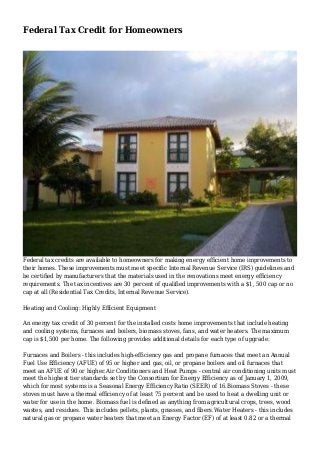
Federal Tax Credit for Homeowners
- 1. Federal Tax Credit for Homeowners Federal tax credits are available to homeowners for making energy efficient home improvements to their homes. These improvements must meet specific Internal Revenue Service (IRS) guidelines and be certified by manufacturers that the materials used in the renovations meet energy efficiency requirements. The tax incentives are 30 percent of qualified improvements with a $1, 500 cap or no cap at all (Residential Tax Credits, Internal Revenue Service). Heating and Cooling: Highly Efficient Equipment An energy tax credit of 30 percent for the installed costs home improvements that include heating and cooling systems, furnaces and boilers, biomass stoves, fans, and water heaters. The maximum cap is $1,500 per home. The following provides additional details for each type of upgrade: Furnaces and Boilers - this includes high-efficiency gas and propane furnaces that meet an Annual Fuel Use Efficiency (AFUE) of 95 or higher and gas, oil, or propane boilers and oil furnaces that meet an AFUE of 90 or higher.Air Conditioners and Heat Pumps - central air conditioning units must meet the highest tier standards set by the Consortium for Energy Efficiency as of January 1, 2009, which for most systems is a Seasonal Energy Efficiency Ratio (SEER) of 16.Biomass Stoves - these stoves must have a thermal efficiency of at least 75 percent and be used to heat a dwelling unit or water for use in the home. Biomass fuel is defined as anything from agricultural crops, trees, wood wastes, and residues. This includes pellets, plants, grasses, and fibers.Water Heaters - this includes natural gas or propane water heaters that meet an Energy Factor (EF) of at least 0.82 or a thermal
- 2. efficiency of at least 90 percent. Electric heat pump water heaters must meet an EF of at least 2.0.Fans - this includes high-efficiency fans used in a natural gas, propane, or oil furnace heating and cooling systems that use no more than two percent of total heating system energy used.Home Renovations: Insulation, Sealing, Window, and Roof Upgrades A home improvement energy tax credit for insulation, window, and roof upgrades is based on the cost of the materials installed only and does not include the cost of labor. The maximum cap is $1,500 per home. The following provides additional details for each type of upgrade: Insulation - adding insulation to exterior walls, attics, basements, and crawl spaces to reduce heat energy loss or gain.Sealing - involves sealing cracks in exterior doors, windows, walls, ceilings, closets, heating and cooling duct work, floors, and other areas that allow heat loss or gain to or from the outside.Windows - replacing windows with energy efficient double-pane glass and non-metal frames to reduce heat loss and gain. Qualified windows must be equal to or below a 0.30 U-Factor and Solar Heat Gain Coefficient (SHGC).Exterior Doors - qualified doors need to have National Federation Rating Council certified U-Factor and SHGC ratings that do not exceed 0.30.Roofs - includes metal roofs and asphalt roofs with cooling granules that meet Energy Star standards. Metal roofs with Energy Star certified coatings can save over 20 percent on cooling costs.Solar Systems: Water Heating and Power Energy A home improvement energy tax credit of 30 percent for home improvements installed costs for solar heating and power systems. There is no maximum cap for systems installed after 2008, before then there is a $2,000 cap. The following provides additional details for each type of upgrade: Solar Water Heating - these systems must be certified for performance by the Solar Rating Certification Corporation under their OG-300 Design and Guidelines. The credit is not available for expenses to heat swimming pools or hot tubs.Solar Power - these photovoltaic systems must provide electricity for the residence and must meet applicable fire and electrical code requirements.These energy tax credits are designed for existing homes and must be the homeowner's primary residence. Homeowners must keep manufacturers certification statements with their records; however, they are not required to submit it with their tax return. Any homeowner should contact a tax specialist or the IRS for specific questions. Also, most contractors who install these energy efficient upgrades have additional information regarding these tax credits. Before undertaking renovation projects there are several things that homeowners should know about home improvement. This information is important to successfully make renovations to their home to improve their home's comfort and utility, along with seeking a good return on investment.
- 3. ReferencesThe Tax Incentives Assistance ProjectInternal Revenue Service Form 5695TAX101 https://suite.io/david-r-wetzel/313y20x Click here for more about car dealers and cars.